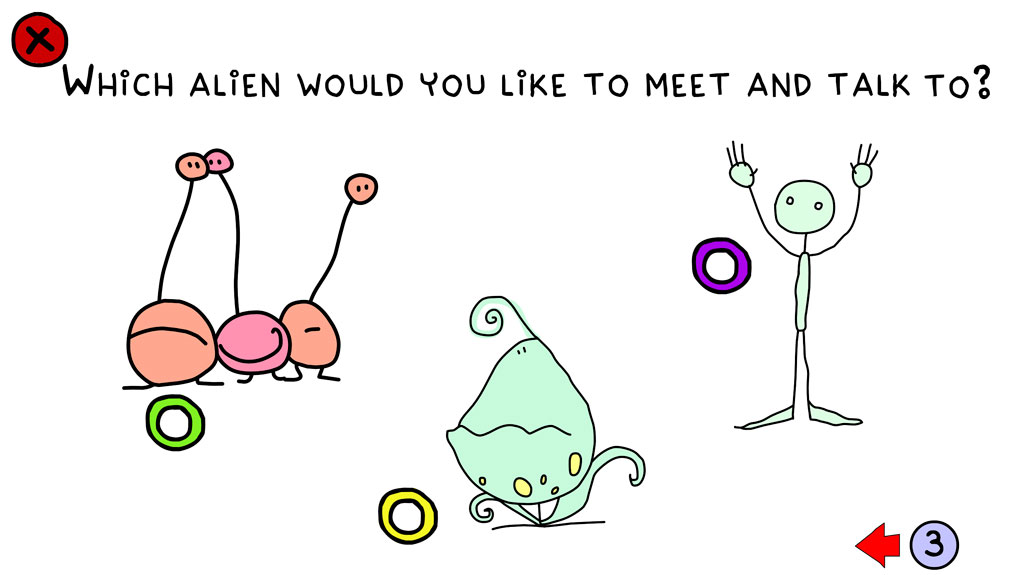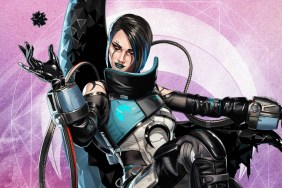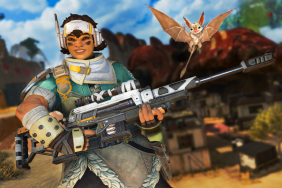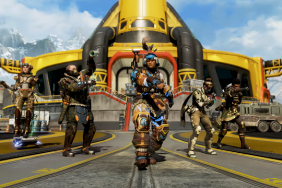Adorable but not durable.
Doki-Doki Universe, the first game from indie developer HumaNature Studios, is more of an experiment than anything. It's comprised of both a game with a loose narrative and a ton of personality quizzes, all focused on revealing more about how we think and interact with each other. It’s all so well-wrapped in cuteness that it’s worth taking a look, assuming you’re willing to forgive certain bugs.
The gist of the story is that a robot, QT3 for short, was abandoned for some reason by its family/owners on an asteroid. Eventually, an alien, aptly named Alien Jeff, finds it and informs it that its model is being scrapped. However, Jeff gives QT3 the ability to prove that it can demonstrate and learn about humanity in the hopes of preventing its fate. With this in mind, QT3 is dropped on a home planet with a balloon and a psychoanalyzing therapist, aptly named Doctor Therapist.
Obviously, nothing about the main narrative is going to garner any writing awards, but the tales you witness on other planets are incredibly cute and charming nonetheless. QT3 flies from planet to planet, meeting aliens and people and creatures, and helps them with their struggles. The stories run the human nature gamut from prejudice to love to self-sacrifice.
The way they’re presented, though, is mild and adorable, making it easy to ignore any grand moral lessons. It’s plain to see why Doki-Doki Universe can’t be more serious in tone, so it seems families with children will get more of a benefit from learning about humanity than adults playing on their own. The soundtrack is fun and funky, but one would expect no less from a company boasting the creator of Toe Jam & Earl among its staff.
Interaction in Doki-Doki Universe is made exceedingly simple, particularly on the Vita version, where tapping on a character presents QT3 with options. You have the ability to chat, summon objects from a growing library you collect, or review a personality card. Each character’s personality card contains likes and dislikes and also an indication of how to make that character give QT3 a present. You’d think that endearing yourself to someone would earn presents, but you have to get some to hate QT3 to bribe it to leave them alone.
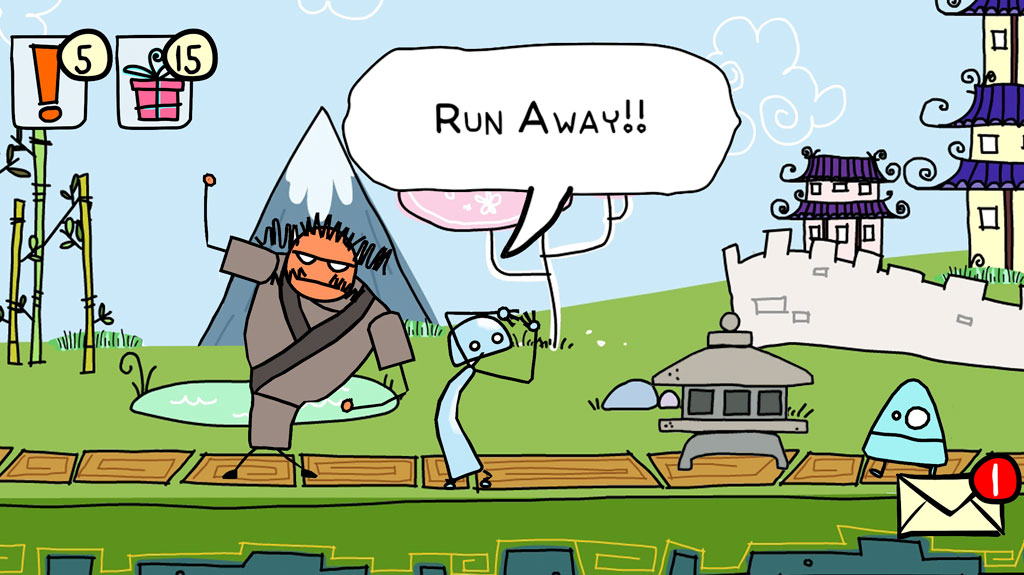
On top of revealing objectives to complete, chatting with characters reveals more likes and dislikes to be noted on their cards and the cards of others on the same planets. Presents obtained from each planet and characters contain summonables, decorations for your home planet, and dust bunnies, the currency which QT3 uses to summon (and cause earthquakes). Completing objectives also nets QT3 some more summonables and experience in the form of grubs.
What I thoroughly enjoyed throughout the whole experience was testing the variety of summonables I could use to complete objectives. Much like Scribblenauts, QT3 is not restricted in its approach to problem solving. A character who wants a vehicle to travel around in will accept a spaceship right alongside a tiny car, and each summonable has its own cute animation to accompany it.
Doki-Doki Universe also falls on the progressive side of gaming. There are two scenarios where you’re asked to find soulmates for people. Both times I paired each with a member of their own gender and everybody was immediately happy. There were also girls who liked evil robots and boys who loved beautiful, sparkly objects. This is refreshing for adults, and this kind of unrestricted play style goes a long way with children whose imaginations are less bound by prejudices.
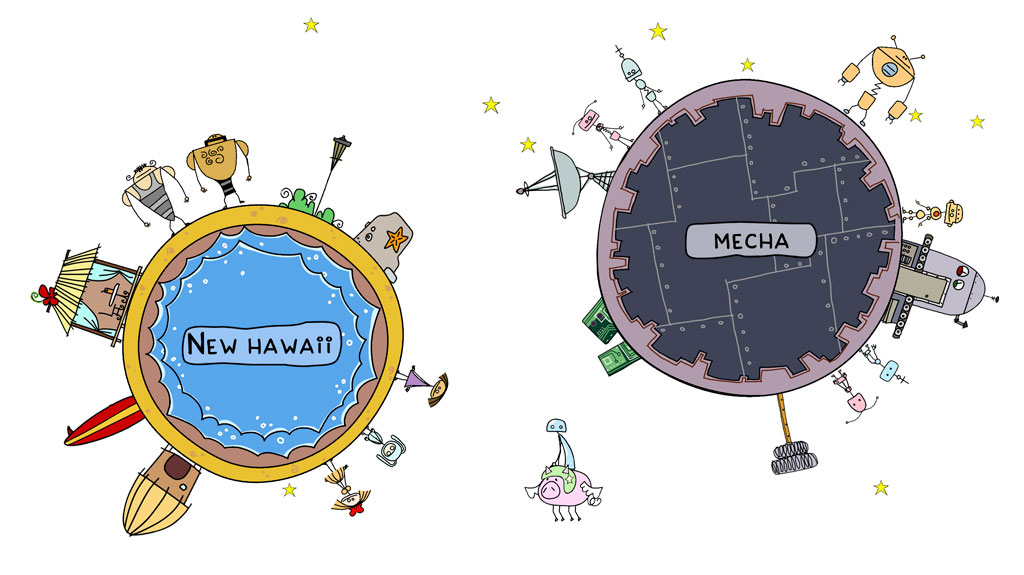
When QT3 is not planet-hopping, you have the option of landing on asteroids and taking personality quizzes from monks of varying shapes and nomenclature. The quizzes ask players to interpret scenes, choose preferences, reveal their feelings, and resolve scenarios in ways that fit them best. Each quiz presents a quick analysis about the player's choices and allows players to understand how those analyses were made. After taking a certain amount, Doctor Therapist will build a personality profile that encompasses all of the player's quiz answers, which describes the player, assesses their yin and yang and whether he or she is in their right mind, and attaches archetype labels to their personality.
This aspect of Doki-Doki Universe was very fun. On top of learning more about myself, I enjoyed how varied and cute each quiz was, often utilizing my summonables to create narratives and punctuate answers. The personality profile is also a great mechanic because it takes into account contradictory responses. This is something players of all ages will get a kick out of, and it also ensures that only one person can answer during the course of any one playthrough.
Although I’ve doted on every aspect of this game, completing it revealed that its mechanisms are prone to buckling under their own cuteness. Pulling up options and interacting often felt delayed or laggy, and generating a screen full of summonables dropped the frame rate significantly on PS3. The worst happened when I’d be doing a lot of summoning—either to complete objectives or get someone to love/hate QT3—as the game would just hard-freeze. One time getting up to reset my console manually was irritating enough, but ten times left me rather frustrated by the end.
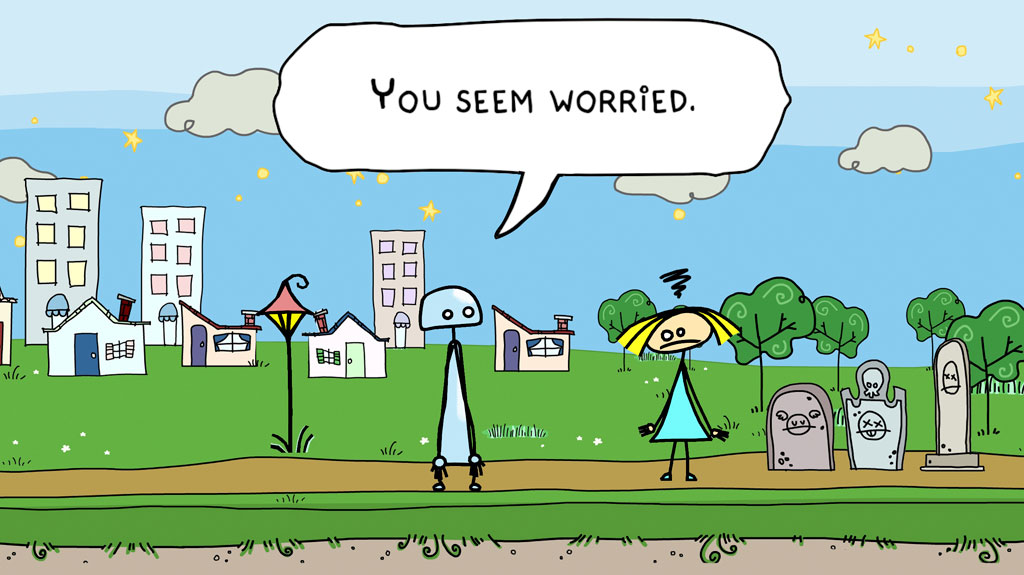
The Vita version fared much better, however, with less chugging and no freezing, no matter how much I tried to replicate the issue. Also, the touch controls are more effective and responsive. Players who purchase the title will unlock all versions of the game, and those who use the cloud-saving feature can enjoy a seamless experience across each. My preference is clear.
The more critical issue I have with Doki-Doki Universe is that it never exceeds being cute and charming. The main narrative’s resolution comes with no fanfare and no end credits, allowing players to continue exploring immediately, and each smaller story is too light and fluffy to be impactful. Customizing QT3’s home planet is not remarkably fulfilling either, since you don’t need to go there often except to try out new looks for QT3 and his universe-traveling steed. (Geisha on a flying sushi FTW!)
The game also features a messaging system that can link up with Facebook. You can send messages containing animations and decorated text to your IRL friends, but at the time of review, none of the messages I sent actually made it to my Facebook friends. Furthermore, on the universe map are six planets and 24 asteroids tucked behind pay walls, which are currently unavailable. After completing the main experience, I don’t envision myself or many others wanting to bother with these unless they eventually come cheap or free. If anything, seeing them on the map without being able to access them sours the experience.
I sincerely hope a day-one patch is released for Doki-Doki Universe (at least for PS3) because I’d hate for the charming experience to be inevitably marred by freezes. It’s a fun and fascinating game even if it isn’t especially memorable. Bugs notwithstanding, it’s a tough game not to be at least swooned by. It managed to get a number of laughs and awws out of me more often than the groans.
-
Cuteness abounds...
-
...but freezes when things get too cute
-
Charming and creative interactions and objectives
-
Fun personality quizzes
-
Moderately useless home planet customization and Facebook messaging
-
Lack of memorability for all its notability
-
More experiment than game
